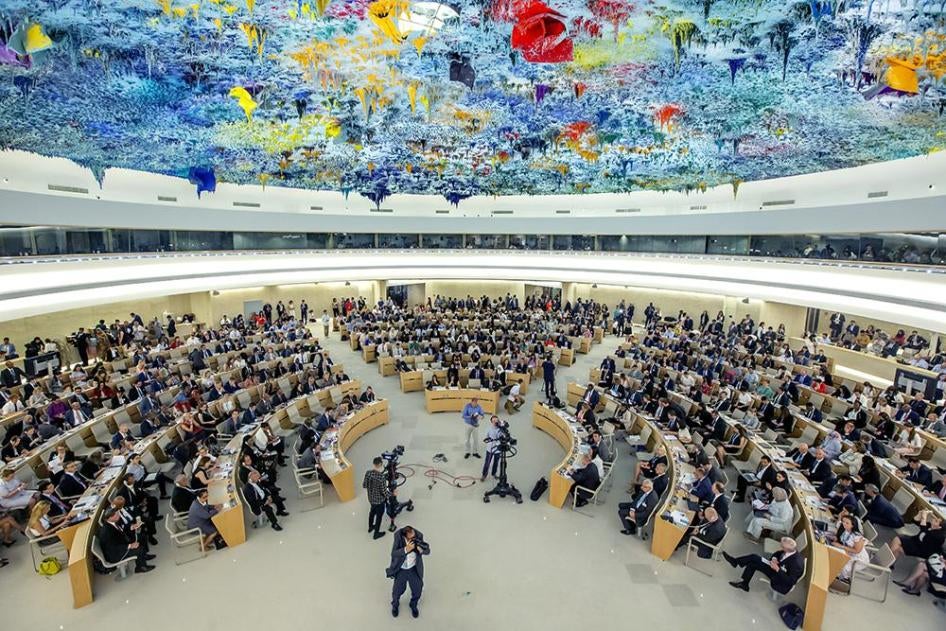(Geneva) – The United Nations Human Rights Council should establish a commission of inquiry during its September 2019 session to investigate serious human rights violations in Venezuela, Human Rights Watch said today in a joint document prepared by 11 Venezuelan and international human rights organizations. The groups have been monitoring and documenting Venezuela’s spiraling human rights and humanitarian emergency for years.
The UN high commissioner for human rights, Michelle Bachelet, is scheduled to present an oral update on the human rights situation in Venezuela before the UN Human Rights Council on September 10. This presentation, which follows a damning report published by her office in July, is the final step mandated by the council resolution on Venezuela, its first, adopted in September 2018.
“The victims of the dire human rights and humanitarian crisis in Venezuela deserve a thorough and authoritative response from the Human Rights Council to address their right to truth, justice, and reparations,” said José Miguel Vivanco, Americas director at Human Rights Watch. “The Human Rights Council has the opportunity and responsibility to create a mechanism to investigate grave violations in Venezuela and to identify those responsible and, where possible, the chain of command.”
The report by Bachelet’s office documented abuses that are consistent with previous findings by her office and Venezuelan and international human rights organizations, and highlighted the need for accountability. The abuses include arbitrary arrests, torture, extrajudicial executions, and violations to the rights to food and health. A commission of inquiry is needed to identify those responsible and break the cycle of impunity.
The UN Human Rights Council should give a commission of inquiry a strong, clearly defined mandate to investigate reports of violations of international human rights law in Venezuela, including, but not limited to, torture and inhuman treatment, arbitrary detention, discrimination, enforced disappearances, as well as violations of freedom of expression, the right to life, and the rights to health and food, the groups said. It should be provided with adequate resources to investigate and report back to the UN Human Rights Council on these violations within a specific period and be mandated to share its findings with the UN secretary-general and relevant UN bodies, including the UN Security Council and General Assembly.
The UN Human Rights Council is particularly well suited to allow for countries or a group of countries, including on a regional level, to take the lead in mobilizing support to address the human rights crisis. The Lima Group, which currently consists of 10 Latin American countries and Canada, has been leading efforts in Geneva to scrutinize the human rights situation in Venezuela, and could take the lead in establishing a commission of inquiry.
A commission would not be a substitute for criminal investigations into specific crimes. But the information gathered may be relevant for authorities considering criminal proceedings, including the International Criminal Court prosecutor, Fatou Bensouda, who opened a preliminary examination into the situation in Venezuela in February 2018.
If a commission of inquiry is created, Venezuelan authorities should cooperate with it fully, including by giving it access to the country and by responding to requests for relevant documents and interviews with officials. However, a refusal by the government of Venezuela to engage with a commission should not prevent commissioners from carrying out their work. Commissions of inquiry for North Korea, Myanmar, and Syria have successfully produced reports extensively documenting human rights violations and international crimes, despite the refusal of those governments to cooperate.
The joint document was prepared by Acción Solidaria, Amnesty International, Centro Derechos Humanos – Universidad Católica Andrés Bello, CEPAZ, Civilis Derechos Humanos, COFAVIC, Espacio Público, Global Centre for the Responsibility to Protect, Human Rights Watch, the International Commission of Jurists, and PROVEA.
For a question and answer on a commission of inquiry on Venezuela, please visit:
https://www.hrw.org/sites/default/files/supporting_resources/un_inquiry_for_venezuela.pdf







